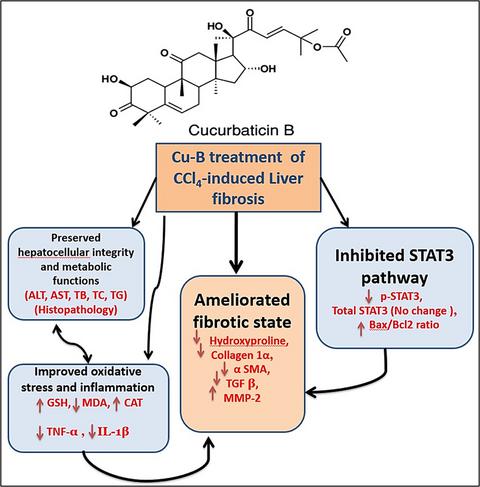当前位置:
X-MOL 学术
›
Chem. Bio. Drug Des.
›
论文详情
Our official English website, www.x-mol.net, welcomes your
feedback! (Note: you will need to create a separate account there.)
Cucurbitacin‐B attenuates CCl4‐induced hepatic fibrosis in mice through inhibition of STAT‐3
Chemical Biology & Drug Design ( IF 3.2 ) Pub Date : 2018-01-11 , DOI: 10.1111/cbdd.13160 Alaliaa M. Sallam 1 , Ahmed Esmat 2 , Ashraf B. Abdel-Naim 2, 3
Chemical Biology & Drug Design ( IF 3.2 ) Pub Date : 2018-01-11 , DOI: 10.1111/cbdd.13160 Alaliaa M. Sallam 1 , Ahmed Esmat 2 , Ashraf B. Abdel-Naim 2, 3
Affiliation

|
Liver fibrosis is a major health concern worldwide. Inhibitors of Signal Transducer and Activator of Transcription 3 (STAT3) have been reported to attenuate experimental liver fibrosis. Therefore, the aim of this study was to investigate the potential ameliorative effect of cucurbitacin‐B (Cucu‐B) against CCl4‐induced liver fibrosis in mice. Treatment with Cucu‐B (5 mg/kg) preserved hepatocellular membrane integrity and amended the metabolic function as indicated by preventing the rise of serum liver function markers. This was confirmed histologically. CCl4‐induced oxidative stress was improved by Cucu‐B treatment (1 and 5 mg/kg). Furthermore, Cucu‐B treatment ameliorated the fibrotic state as evidenced by inhibiting the rise of hydroxyproline liver content and mitigating the overexpressions of collagen‐1α, α‐smooth muscle actin (α‐SMA) and transforming growth factor beta (TGF‐β) as well as the downexpression of matrix metalloproteinase‐2 (MMP‐2) mRNA. Importantly, STAT3 activity was inhibited by Cucu‐B as confirmed by decreased phosphorylation of STAT3 without changing total STAT3 expression. This was substantiated by the reduced Bcl‐2 together with increased Bax mRNA expressions with subsequent elevation of Bax/Bcl‐2 ratio. In conclusion, Cucu‐B hampers CCl4‐induced liver fibrosis in mice. This can be attributed—at least partly—to inhibition of oxidative stress, inflammation and STAT3 signalling.
中文翻译:

葫芦素B通过抑制STAT-3减轻小鼠CCl4诱导的肝纤维化
肝纤维化是全球主要的健康问题。据报道,信号转导子和转录激活因子3(STAT3)的抑制剂可减轻实验性肝纤维化。因此,本研究的目的是研究葫芦素B(Cucu-B)对小鼠CCl 4诱导的肝纤维化的潜在改善作用。用Cucu-B(5 mg / kg)处理可保持肝细胞膜完整性,并通过防止血清肝功能标志物升高来改善代谢功能。这在组织学上得到了证实。四氯化碳4Cucu-B处理(1和5 mg / kg)改善了诱导的氧化应激。此外,Cucu-B治疗改善了纤维化状态,这可以通过抑制羟脯氨酸肝含量的上升并减轻胶原蛋白-1α,α-平滑肌肌动蛋白(α-SMA)的过度表达和转化生长因子β(TGF-β)来证明。以及基质金属蛋白酶2(MMP-2)mRNA的下表达。重要的是,STAT3活性被Cucu-B抑制,这可以通过降低STAT3的磷酸化而不改变总STAT3的表达来证实。Bcl-2的减少和Bax mRNA表达的增加以及随后Bax / Bcl-2比率的升高证实了这一点。总之,Cucu-B阻碍了CCl 4诱发小鼠肝纤维化。这可以至少部分地归因于对氧化应激,炎症和STAT3信号转导的抑制。
更新日期:2018-01-11
中文翻译:

葫芦素B通过抑制STAT-3减轻小鼠CCl4诱导的肝纤维化
肝纤维化是全球主要的健康问题。据报道,信号转导子和转录激活因子3(STAT3)的抑制剂可减轻实验性肝纤维化。因此,本研究的目的是研究葫芦素B(Cucu-B)对小鼠CCl 4诱导的肝纤维化的潜在改善作用。用Cucu-B(5 mg / kg)处理可保持肝细胞膜完整性,并通过防止血清肝功能标志物升高来改善代谢功能。这在组织学上得到了证实。四氯化碳4Cucu-B处理(1和5 mg / kg)改善了诱导的氧化应激。此外,Cucu-B治疗改善了纤维化状态,这可以通过抑制羟脯氨酸肝含量的上升并减轻胶原蛋白-1α,α-平滑肌肌动蛋白(α-SMA)的过度表达和转化生长因子β(TGF-β)来证明。以及基质金属蛋白酶2(MMP-2)mRNA的下表达。重要的是,STAT3活性被Cucu-B抑制,这可以通过降低STAT3的磷酸化而不改变总STAT3的表达来证实。Bcl-2的减少和Bax mRNA表达的增加以及随后Bax / Bcl-2比率的升高证实了这一点。总之,Cucu-B阻碍了CCl 4诱发小鼠肝纤维化。这可以至少部分地归因于对氧化应激,炎症和STAT3信号转导的抑制。











































 京公网安备 11010802027423号
京公网安备 11010802027423号